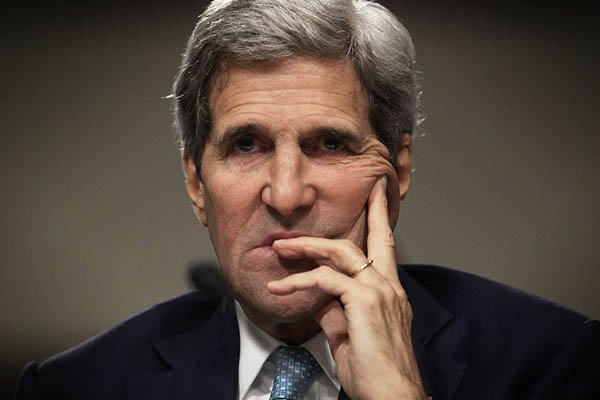
Alex Wong-Getty Images North America—AFP
Officials call for the U.S. military to directly target Bashar al-Assad’s regime.
A group of U.S. diplomats have used a State Department channel for dissident views to criticize President Barack Obama’s Syria policy, a spokesman confirmed Thursday.
The official would not discuss the contents of the cable, but the New York Times and Wall Street Journal said the dissenters call for U.S. strikes against the Syrian regime. News of the critical cable came as the Pentagon warned that Assad’s Russian allies have bombed U.S.-backed rebels.
“We are aware of a dissent channel cable written by a group of State Department employees regarding the situation in Syria,” said State Department spokesman John Kirby. “We are reviewing the cable now, which came up very recently,” he added.
The department’s “Dissent Channel” allows diplomats who disagree with an official policy line to register their concerns with senior staff without fear of retribution. Kirby said U.S. Secretary of State John Kerry “values and respects” the dissent channel, but would not be drawn on whether he believes this specific complaint has merit.
According to the New York Times, which said it had seen a draft of the memo, the diplomats call for the U.S. military to directly target Bashar al-Assad’s regime.
U.S. forces are engaged in Syria but are assisting local militias to fight the Islamic State jihadist group, not confronting Assad’s Russian and Iranian-backed forces.
The memo, according to the Times, calls for “a judicious use of stand-off and air weapons”—in other words cruise missiles, drones and perhaps direct U.S. airstrikes.
With only seven months left in office and a clear aversion to getting bogged down in Middle East conflicts, Obama has shown little appetite for such action. But the administration’s alternative policy—to work with Russia to secure a ceasefire in Syria’s civil war and talks on a political transition—has made little headway.
The Journal report said the memo was signed by 51 mid- to high-level senior State Department officials. In the earlier stages of the now five-year-old Syrian civil war, Kerry himself was a proponent of tougher action to aid so-called moderate rebels fighting Assad’s regime.
In August 2013, after Assad crossed what Obama had said would be a “red line” by using chemical weapons, Kerry made a strong speech that many saw as foreshadowing U.S. strikes. But the president famously backed down shortly afterwards, calling off strikes with allied aircraft already primed to scramble, and leaving Kerry out in the cold.
According to a detailed report on Obama’s foreign policy by the Atlantic Magazine’s Jeffrey Goldberg, Kerry felt he had been let down and U.S. credibility had taken a knock.
The alternative diplomatic approach to dealing with Assad led to the creation of the 22 nation International Syria Support Group, chaired by Washington and Moscow. Under pressure from the ISSG, Assad and the rebels have agreed a nominal “cessation of hostilities.” But talks on a political transition have yet to materialize and Assad’s forces—sometimes backed by Russian warplanes—have continued to launch offensives.
